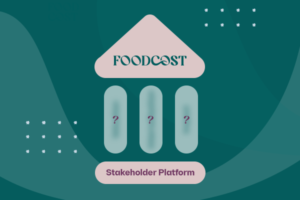The importance of our Stakeholder Platform
06 Sep. 2023
In order to pave the way towards more sustainable food systems, the FOODCoST methodology rests on the creation of a Stakeholder Platform, ensuring a multi-actor approach that is key for the development of project outcomes. But what is exactly is this Stakeholder Platform, and why is it so important?

Defining Stakeholder Engagement
Since the topic of food systems is one that affects society as a whole, it is crucial to set up multi-actor initiatives which bring industry, government, civil society and academia together. In collaboration, these stakeholders help to provide a sector-wide vision and define better methods for food system transition.
This collaborative effort ensures that key stakeholders are involved both in the conceptualization of the FOODCoST methodology, but also in its implementation. They take part in the project during all of its stages, from research to results – in fact, stakeholders are crucial for the advancement of the project from one stage to another. As such, actors from areas such as farming, the AgriFood Business, Education and Research, Civil Society, as well as governments, were recruited for the establishment of a broad and representative Stakeholder Platform.
The Stakeholder Platform
Firstly, the FOODCoST Stakeholder Platform entails a Community of Practice (CoP), which brings together 30 selected experts from the categories mentioned above. This CoP will be maintained and consulted throughout the duration of the project, thanks to the establishment of channels that will allow members to communicate among themselves and with project partners, as well as through periodic meetings.
In addition to this selected group, a larger stakeholder cluster consisting of at least 300 members will join the Mobilisation and Mutual Learning (MMLs) Workshops. The purpose of these MMLs is to tackle the FOODCoST research and innovation challenges. The workshops will address topics crucial to project development, such as methodology and data to calculate external costs and benefits, as well as internalisation policies and business models. Existing policies for the internalisation of externalities will be analysed, and their impact and efficiency will be assessed. Each MML has its own target groups.
Besides these discussion topics, the MMLs will also play a key role in presenting the Case Studies related to the FOODCoST project and their results. The Case Studies conducted throughout the project vary, ranging from assessing the effectiveness of carbon/sugar taxes, to internalizing externalities in the cultivation of coffee and green beans in Africa!
During the final stages of the project, both the CoP and the MML workshops will be essential for discussing and improving the FOODCoST Roadmap, which will enable policy makers and business actors to enhance the European Union’s ability to contribute to the transition towards sustainable food systems.
Besides the dialogue established with key stakeholders, FOODCoST will also collaborate with similar projects that focus on the transition to more sustainable food systems.
The synergies created between this extremely diverse Stakeholder Platform, along with a consortium consisting of partners from 13 different countries, will allow for a truly representative vision of current food systems and the challenges they present. Thanks to this broad overview, FOODCoST will be able to provide a set of improved and harmonised analytical instruments for valuation and internalisation of externalities that will take various inputs into account, benefiting the EU as a whole.
